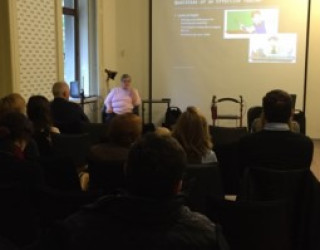The GIPA Center for Excellence in Teaching annually conducts internal survey in the university on the quality of academic processes. Based on the analysis of the survey data, university organizes seminars and workshops for the academic personnel in order to ensure a continuous improvement of the teaching process.
In 2015, in response to the results of the survey, special attention was paid to the introduction of modern methodologies and approaches in teaching as well as enhanced supervision for the bachelor’s and master’s theses.
On 7 November, GIPA Frontline Club hosted a seminar on the subject of “Results-oriented teaching and the supervision of students in the researching process”. The training was led by Terry Anderson, the professor at GIPA’s partner – Troy University (Alabama, USA) http://trojan.troy.edu/artsandsciences/politicalscience/mpa/faculty/anderson.html
The seminar was dedicated to the important issues of teaching among those were the motivation of teachers, the importance of effective communication, the role of students, as of active participants of the teaching process, Teacher’s individual approach to each student, introduction of modern teaching methodology, supervision of students in the researching process. The seminar was attended by GIPA’s academic staff and invited lecturers. The seminar deserved high praise from the guests.
Dali Berikashvili: “I used one of the methods proposed by Ms. Anderson on the very first lecture following the training.”
Zhana Antia: “The seminar was very interesting as it was led by highly experienced people who base their teaching on real life examples. GIPA holds similar workshops on annual basis and the knowledge acquired through these seminars is of great help in the teaching process.”
Nino Dolidze: The seminar led by Doctor Terry Anderson was extremely interesting and covered such important issues as the interactive nature of the education process, motivation of students, and use of modern teaching methods. It is noteworthy that Doctor Anderson shared with us her personal experience related to the improvement of the teaching process.”
Levan Asatiani: “I am very happy with the seminar, it was focused on concrete challenges and gave plenty of information. Ms. Anderson certainly has put great deal of effort as she managed to share her personal experience and conveysuch large amount of information in this short period of time.”


